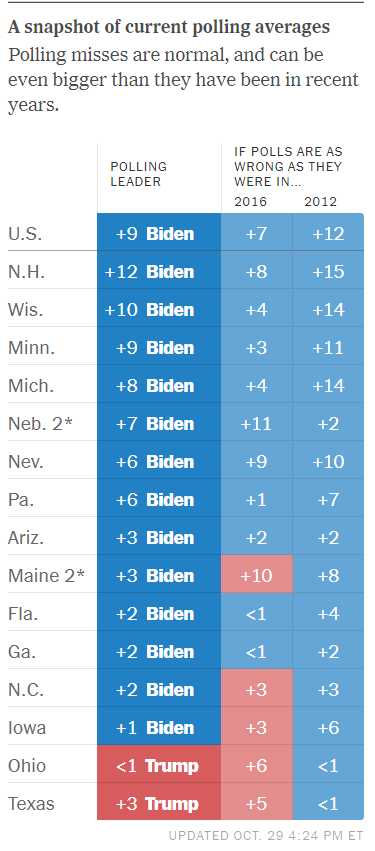I want to talk about a concept we don’t talk about enough in electoral (or post-electoral) politics—the intense and instant emotional resonance of election night. There is a way in which the emotions of that moment can imprint on the human psyche in a way that has lasting consequences for the weeks, months, and years to come. And before we begin the process of digesting the results of next week’s election night, it’s worth pondering how the emotions of the moment might impact the rest of 2020, and beyond.
As one of the relatively few national commentators who’s based in the midst of MAGA country, I’m often asked to “explain” my family, friends, and neighbors. And one of the most common questions is some version of this one: “I can understand why Republicans vote for Trump, but I can’t understand why they love him so much. I can’t understand the incredible devotion.”
It’s a good question. After all, while Trump won the 2016 GOP nomination rather handily, he won it while winning one of the smallest shares of the vote in the primary era, he faced opposition up until and through the Republican convention (remember Ted Cruz’s famous refusal to publicly endorse Trump during his convention speech?), and he was famously the “last choice” of numerous GOP primary voters. Yet now he commands intense Republican loyalty.
I don’t think you can fully explain the love without understanding election night. Until approximately 10:39 p.m. Eastern Time on November 8th, many millions of Republicans were convinced that they were going to lose…again. And it wasn’t going to be just any election loss. They were going to lose to Hillary Clinton. The Clinton machine that they’d been fighting for the better part of a quarter-century was coming back, triumphant.
Outside of Trump’s most enthusiastic base, there was a pervasive sense of gloom and dread—and a lingering sense of disbelief. Trump was the man the voters picked to take on Hillary? Really?
Then 10:39 rolled around, and the networks called Ohio for Trump. The first swing-state domino fell. Next came Florida at 10:53 and North Carolina at 11:14. I’ll never forget the moment. I was watching the returns with a number of other Christian Trump opponents, and while we knew Trump had a chance (in an interview earlier in the day, I’d pegged his odds at around 30 percent), it was still shocking to watch it happen.
At 12:06 a.m., he took Iowa, and then at 1:35 a.m. he clinched the election and took Pennsylvania.
I confess that I felt an involuntary surge of something approaching glee. I was surprised at how happy I was that Trump beat Hillary and ended (for now, at least) the Clinton political dynasty. I’d been a Republican my entire adult life, and I’d fought against the Clintons since my second year of law school. For a brief, shining moment, the Republican in me exulted in the outcome.
Then I woke up the next morning, remembered Donald Trump was about to be president of the United States, and my joy faded. But for millions of Americans that joy never faded. In that moment, the combination of an upset win over perhaps the most-disliked Democrat in America and the obvious shock and chagrin of the mainstream media bonded Trump to Republicans in a way that was difficult to put into words.
But it did something else. It rendered many millions of Republicans impervious to bad news. Weren’t the polls wrong? Didn’t Trump endure the worst imaginable news cycles and prevail? Didn’t he demonstrate that the experts were wrong?
And so here we are now, when the polls are far worse for Trump and far less volatile than they were in 2016, and we still see survey results like these, from Wisconsin:
In fact, there many, many Trump voters who aren’t just confident about Trump’s victory, they’re positively scornful of the idea that he could lose—or at least of the idea he could lose fairly.
So given the power of emotion and the level of both confidence and concern in this nation (for example, a USA Today poll finds that 75 percent of Americans are “very” or “somewhat” concerned about violence on election day and afterwards), can we predict the enduring emotional consequences of November 3rd?
I think it’s easiest to anticipate what happens if Trump wins. A second upset victory—achieved in the face of even worse polling, extreme levels of voter turnout, in spite of the Russian investigation and impeachment, and in the midst of the pandemic—would bond GOP voters tighter to Trump than any American constituency has bonded to a politician in the modern history of the United States. (Perhaps ever.)
A second shocking loss, by contrast, would create a sense of deep, almost existential despair on the part of Democrats. If Trump won despite losing the popular vote again (perhaps even by a bigger margin), you would see a growing crisis in confidence in the American system of governance itself—and no amount of “well actually” commentary from conservatives justifying the electoral college would convince despairing Democrats of the virtue of minority rule.
The emotional consequences of a Trump loss, however, are less easy for me to predict. Yes, Democrats would experience a wave of joy—and an increased appreciation for Joe Biden—but there is a deep sense that he should win. I expect more relief than loyalty, followed by nearly-immediate fights over which elements of the Democratic platform should be pushed first—and fast.
But what happens on the right? I’m uncertain. A deep and profound reaction is predictable. Its nature and results are not. At present I think it’s equally plausible that Republicans will turn on Trump as it is that they remain loyal. Did he fail? Or was he betrayed?
That’s one reason why, when people ask me about the future of the GOP if Trump loses, I have a simple, cop-out answer—“Ask me after election day.” Yes, I’ll have all the information the wonks possess. I’ll know which demographics voted for him and which deserted him. I’ll know if many red states started to drift blue. But I’ll also be able to begin to understand the emotion of the moment, and in the short-to-medium term that emotion may well shape the next four years far more than any intellectual analysis.
I think back to 2012—and the way emotion triumphed over data. Republicans I know emerged from the race furious. They thought Mitt had been treated deeply unfairly. They thought he’d been wrongfully and viciously attacked. They also were angry at Mitt. He was “too nice.” He didn’t “fight hard enough.” And when push came to shove in 2016, the anger trumped the RNC’s famed autopsy, the post-election analysis that urged a “kinder, more inclusive” Republican Party.
Or, to put matters more succinctly—after the election, look not to the charts, but to the hearts to discern the future of the GOP.
One more thing…
After talking about emotions, let me drown you in data. Here’s an answer to the question, “What if the polls were as wrong as they were in 2016?” The New York Times has the analysis, and the answer is grim for Trump:

And here’s the bottom line:

In short, if Trump wins, then I, David A. French, will call for a complete and total shutdown of the polling industry until we can figure out what’s going on.
One last thing…
There’s no video today, but there is a prediction. This is my last subscriber-only newsletter before Election Day, and I owe you my best guess at the election outcome. With all due humility and recognition that I could be waaay off, here’s my projected map. I think Biden wins, I think he wins by a 2008/1996/1992 margin, and I think he peels off at least one formerly solid-red state. It could be Texas. It could be Georgia. I’m guessing Georgia. Readers, please share your predictions in the comments.

Photo by Jim Watson/AFP via Getty Images.







Please note that we at The Dispatch hold ourselves, our work, and our commenters to a higher standard than other places on the internet. We welcome comments that foster genuine debate or discussion—including comments critical of us or our work—but responses that include ad hominem attacks on fellow Dispatch members or are intended to stoke fear and anger may be moderated.
With your membership, you only have the ability to comment on The Morning Dispatch articles. Consider upgrading to join the conversation everywhere.